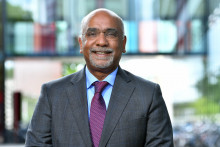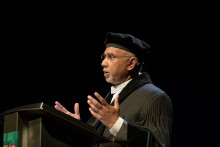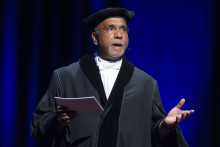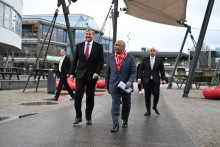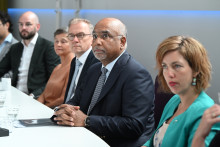Recently, you told Tubantia that 'we do want to keep growing’. However, at U-Today last year, you said there should be no more 'unbridled growth'. What has changed in a year?
Subramaniam: ‘It's about wanting to grow in a controlled way. Even back then, so not much has changed. However, this year has made it even clearer what major transitions society is facing. Right now, we lack the technical talent to meet these challenges. From the labour market, there is a huge need for technically skilled personnel from MBO, HBO and universities. The UT is responding to this need and taking its responsibility. However, we need to address the growth demand with the entire educational system as technical talent is needed at all levels. Ultimately, it is about getting schoolchildren interested in technical professions and courses again. After all, as an educational institution, you can have the ambition to grow, but there has to be a sufficient supply of students.’
Eindhoven and Delft have ambitious plans to meet demand from business and society. What is Twente doing?
‘The context is very local. There is no ASML in Twente with seven thousand vacancies, like in Eindhoven. Within our context, we also educate students for companies like ASML, but in the region we also have responsibility for companies around us, mainly SMEs. The situation with Delft is also difficult to compare. There, space for expansion is limited. That is why they are making plans to open campuses elsewhere, for example in Rotterdam or The Hague. In Twente, space is not an issue. If there is one campus in the Netherlands where building is possible, it is in Twente. Although that doesn't mean we can nor want to overbuild the campus.’
Delft wants to grow to forty thousand students, which is more than forty percent growth. The UT currently has about 12.500 students. What numbers does the UT aim for?
‘It is very difficult to give exact figures. The UT has a qualitative objective: to meet the needs of society while keeping growth manageable. That growth could perhaps lead to 20.000 students, or even more. But we can fulfil our ambitions in various ways. Think about lifelong learners. This group does come to study at UT, but is a completely different type of student. They don't come to live here, for example. Ten thousand new students, does not mean twenty thousand extra feet on campus. The cooperation with the VU is another example. At our university, the Mechanical Engineering study is already at its limits, but by cooperating with Amsterdam we continue to grow and even reach the hinterland of North-Holland.’
With the growing pains the UT is already experiencing, the high workload, vacancies that are hard to fill; is growth realistic?
‘I cannot make a group of teachers magically appear. Therefore, we can only grow at a steady pace and we have to explore all possibilities. Of course growth raises concerns, but if necessary, we will find a solution together. I am convinced of that, as long as we are creative. We as UT cannot do this alone. We have to do it together with entrepreneurs and the municipality, for example when it comes to housing. We also need appropriate funding. You can't sit in the front row for a dime.’
The UT is pretty tight on funds. How is the community responding to these growth plans?
‘I hear positive notions, for example during the University Council. I see people who are constructive and want to think along, even though the challenges are great. We are well aware of that.’
How does the UT want to grow? Are you aiming for more Dutch students, or rather for international growth?
‘This comes back to my previous point. First, we should look at how we want to grow content-wise. Where are additional workers required and how can we contribute to the supply for that demand? Focusing more on Dutch or foreign students is secondary to that.’
Yet Twente is a shrinking region that is ageing. With international students, the possibility exists that you are educating for a brain drain. The stay-rate is not very high in Twente.
‘I refuse to call Twente a shrinking region. Demographically, there is undoubtedly a grain of truth in that, but if you keep emphasizing that notion as a region, young people will definitely leave. We need to show together that all the ingredients are present in Twente. It is not as packed here as elsewhere and you can live beautifully without having to pay huge amounts of money. At the same time, mobility is not a bad thing either. If someone leaves again after five years, that's fine. As long as there remains sufficient throughput. The point is to show that a lot is possible here and that Twente is easily accessible. Even though travelling from Amsterdam to Twente sometimes feels further away than the other way around: two hours of travel remains relative.’
How can the UT contribute to an appropriate business climate?
‘By even better cooperation within the region. First-year students who come to campus are immediately sold. That should also apply to the region. When it comes to settling down permanently, we want students and companies to get more into contact with one another. Take VDL for example, where they have hundreds of vacancies. The same applies the other way round. As a company, think about whether UT students can contribute to existing problems. It is only together that we can achieve growth.’


